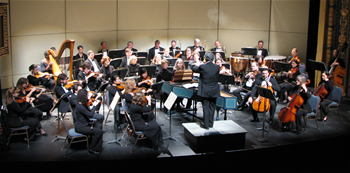Music For A Great Space is but one of Greensboro’s many cultural wonders; their mission is to present some of the finest chamber music in the region. Friday night’s concert given by the Red Clay Saxophone Quartet (named after the Piedmont’s famous red soil) was no exception to this high standard that this organization continues to present with frequency.
The quartet is comprised of Susan Fancer on soprano sax, UNCG music faculty members Steven Stusek and Mark Engebretson on tenor and baritone respectively, and Robert Faub on alto. Each member of this ensemble demonstrated not only wonderful group playing, but some truly superb solo work as well.
The concert began with Chick Corea’s “Spain.” This piece very quickly demonstrated the quartet’s capabilities of blend and balance, evoking the peninsula’s vibrancy and strong tradition of flamenco dancing. What surprised me immediately was this group’s capability to produce such different colors in one piece of music – I generally don’t think of saxophones as capable of such a broad spectrum, having played tenor for jazz band in high school. However, this group quickly banished that thought, and this was not even ten minutes into the concert. Ms. Fancher and Mr. Faub contributed some lovely solos, with very lively accompaniment from their ensemble mates.
Continuing on the jazz way of thought, the next piece was Perry Goldstein’s “Motherless Child” Variations, a composition based on an old spiritual. There was a nice amount of contrast in this piece, providing a good program change from the fizzy opener. Some excellent contrapuntal writing kept the work moving along, even in the slower sections. There were wonderful contributions all around, conjuring up a sound world that was truly special, given that there were but four people playing.
Next on the program was Estonian composer Arvo Pärt’s “Summa.” As Ms. Fancher explained before the piece began, Pärt draws on many influences, such as mysticism and religion. While this may be interesting to some listeners, this reviewer found it to be rather dreary and repetitive. Minimalism is an interesting school of composition, and Pärt is certainly a contemporary of Phillip Glass and Steve Reich, so the influence is there. If anything, it gave the audience a taste of what is arguably one of the more popular compositional forms of the twentieth century. The piece was warmly played and given as much of an inspired performance as possible.
Finishing up the first half of the program was Russell Peck’s “Drastic Measures.” This is the second time that the late Greensboro-based composer’s work has been heard in the Gate City in recent months; I am referring to a barn-storming performance of his saxophone concerto “Upward Stream” that Dr. Kevin Geraldi and the UNCG Symphony Orchestra gave in late November of last year. This piece was as much of a crowd pleaser as the aforementioned concerto. Comprised of two connected movements, the piece is a tour de force for saxophone quartet, and the group handled the work with an ease of execution that was most admirable. The piece was filled with an exhilarating drive and energy that was absorbed by the audience, given their more than enthusiastic response at its conclusion. Ms. Fancher’s weaving soprano sax work was quite the feat of virtuosity, and the rest of the group was clearly fueled by her extroverted handling of Peck’s fiendish writing.
The second part of the concert opened with a piece that had been jointly commissioned between Music For A Great Space and the quartet, David Rokawski’s “Compass.” New music is always a tricky business, simply because it’s never been heard before and audiences can be mercurial in response. This reviewer found the piece’s unengaged writing and recycling of the same material over and over again for twenty-five minutes to be a taxing endeavor. While it’s a feather in the cap of any ensemble to be able to commission a work, this does not necessarily mean that the music will warrant further performance. To me, it very much sounded like Pärt’s minimalism, just stripped down more and then sped up and slowed down for four movements. The audience responded politely but not enthusiastically.
Closing the written program was Thierry Escaich’s “Tango Virtuoso.” I thought that bookending the concert with two Spanish-influenced pieces was a very clever move on the part of the quartet, and this exciting little romp was a perfect closer. The playing continued to dazzle, with no slacking off of intensity and drive. The audience’s ovation was proof positive of the brilliant playing and music making of this group. As an encore, the quartet played Ben Johnston’s arrangement of “Oh Waly Waly,” a traditional Scottish melody that went down very nicely and drew the evening to a warm close.
Note: For a review of a recent appearance of this ensemble in Raleigh, click here.











